Zepto's 10-Minute Promise: The Psychology Behind Quick Commerce Marketing
- Nayan Tomar
- Jun 24, 2025
- 5 min read
10 minutes isn't just a delivery promise—it's a masterclass in urgency marketing that's rewiring Indian consumer behavior and creating a ₹3.3 billion market from scratch.
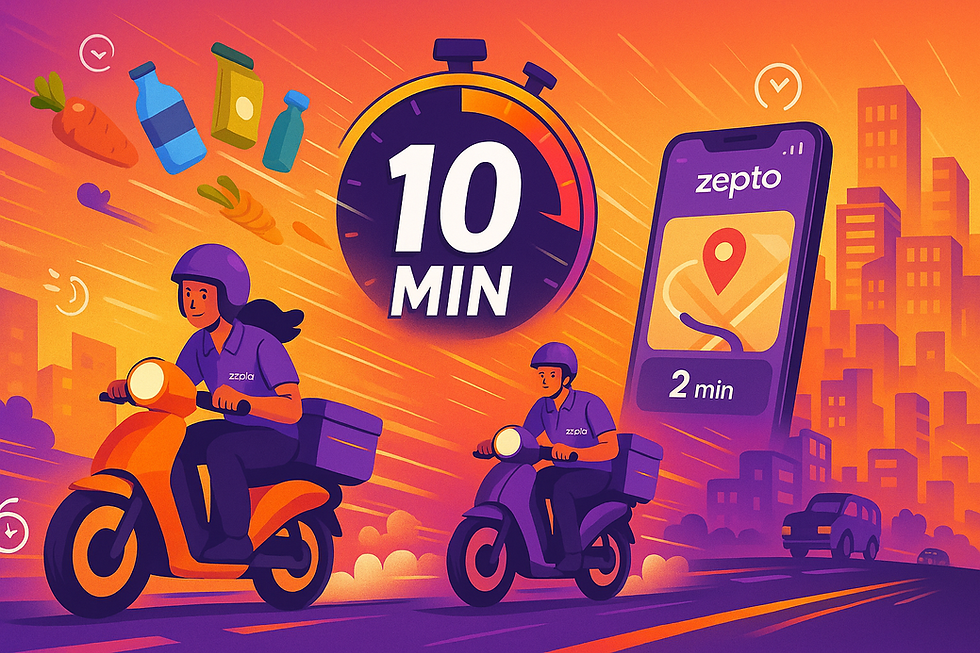
Reading Time: 5 minutes
The Urgency Revolution That Transformed Indian Commerce
When Stanford dropouts Aadit Palicha and Kaivalya Vohra launched Zepto in 2021 with an audacious 10-minute delivery promise, industry experts dismissed it as unsustainable hype. Today, with a $5 billion valuation and over 4 million monthly users, Zepto has proven that time-based value propositions can increase conversion rates by 80% when backed by consistent delivery. But the real story isn't in their dark store network or AI-powered logistics—it's in how they weaponised urgency psychology to create entirely new consumer expectations that competitors are now scrambling to match.
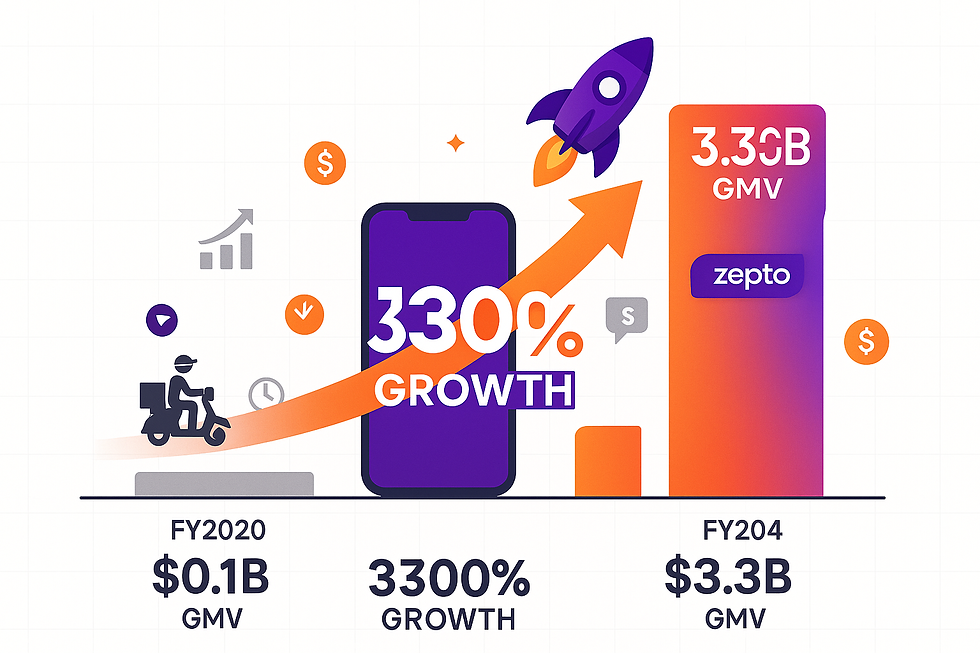
The numbers validate this psychological transformation: India's quick commerce market exploded from $0.1 billion GMV in FY2020 to $3.3 billion in FY2024, with Zepto capturing 21% market share by positioning speed as the primary value driver. Their success demonstrates how time anxiety marketing taps into fundamental human psychology—the cognitive bias where immediate rewards feel disproportionately more valuable than delayed ones. This isn't just fast delivery; it's instant gratification positioning that converts daily necessities into impulsive, time-sensitive purchases.
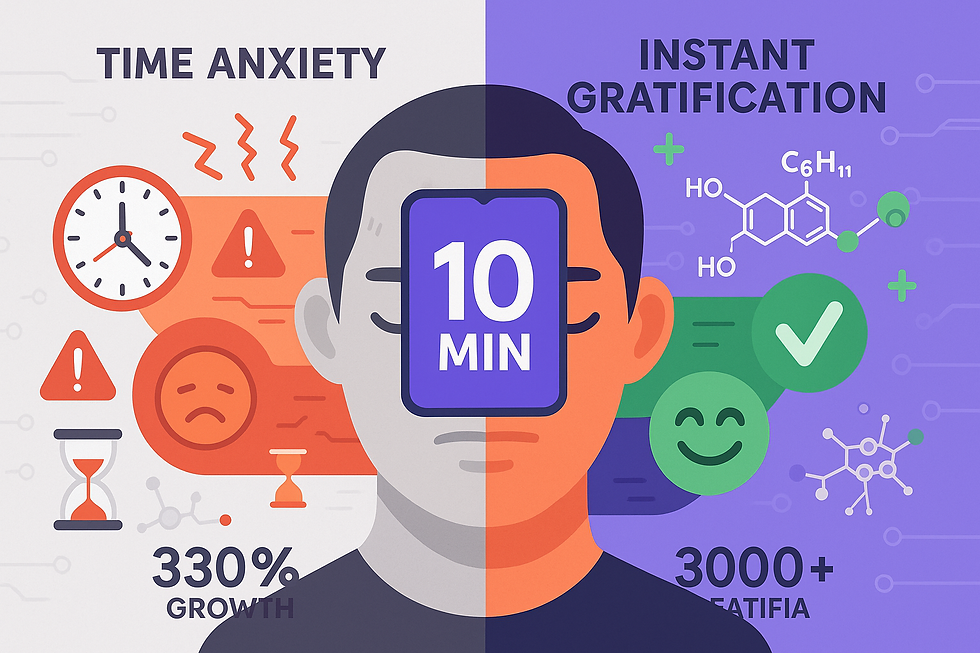
The Psychology of Time-Based Consumer Manipulation
Real-Time Tracking Gamification and Anxiety Creation
Zepto's breakthrough insight was understanding that waiting creates anxiety, but tracking reduces it while amplifying anticipation. Their app transforms delivery from passive waiting into active engagement through real-time tracking that gamifies the entire experience. Users obsessively refresh tracking screens, creating psychological investment in delivery completion that increases satisfaction and repeat usage rates. This approach leverages what behavioral economists call "progress bias"—the tendency to feel more positive about experiences when we can monitor advancement toward completion.

The platform's median delivery time of 8 minutes and 47 seconds isn't just operational efficiency—it's carefully calibrated psychological conditioning. By consistently delivering faster than the 10-minute promise, Zepto creates positive prediction error, where exceeded expectations generate dopamine releases that strengthen customer loyalty. This approach transforms routine grocery purchases into micro-achievements, making users more likely to choose Zepto for the emotional reward of rapid fulfillment rather than purely functional needs.
Competitive Time-Based Differentiation
Zepto's strategy extends beyond speed into urgency hierarchy positioning. While competitors like Blinkit and Swiggy Instamart promise similar delivery windows, Zepto's marketing consistently emphasizes their precision and reliability through specific messaging like "Groceries delivered at Bumrah Speed"—connecting delivery velocity with athletic excellence and precision. This creates comparative urgency, where customers don't just want fast delivery; they want the fastest, most reliable option available.
The psychological mechanism operates through scarcity principle application: if products can arrive in 10 minutes, delayed gratification feels unnecessarily punitive. Zepto amplifies this through strategic messaging about product availability and delivery slots, creating temporal FOMO (fear of missing out) that drives immediate purchase decisions. Their campaigns featuring stretched time scenarios with singers Shankar Mahadevan, Usha Uthup, and Kailash Kher cleverly demonstrate how waiting feels longer than it actually is, positioning Zepto as the antidote to time anxiety.

The Business Model Behind Instant Gratification Marketing
Strategic Infrastructure as Marketing Advantage
Zepto's 350+ dark stores aren't just operational assets—they're marketing infrastructure that enables authentic urgency messaging. Unlike competitors who struggle with consistency, Zepto's ability to deliver on time-based promises 99% of the time (with only 1% of orders taking 15-16 minutes) creates trust-based urgency marketing. When customers believe the promise will be fulfilled, urgency becomes persuasive rather than manipulative.
This operational excellence enables aggressive marketing claims that competitors cannot replicate. Their "Groceries delivered in 10 minutes" tagline isn't aspirational—it's evidence-based positioning supported by median delivery performance. This authenticity transforms time-based marketing from promotional gimmick into sustainable competitive advantage, as customer expectations shift from hoping for fast delivery to expecting it as baseline service quality.
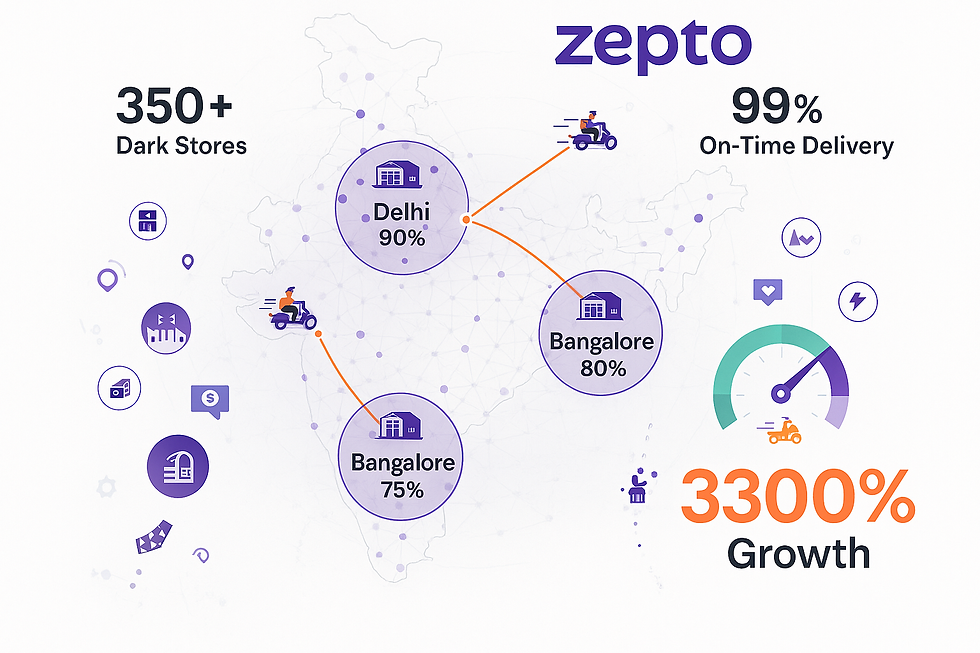
Economic Psychology of Quick Commerce Adoption
The financial impact of urgency marketing extends beyond individual transactions into behavioral pattern modification. Zepto's model increases purchase frequency by reducing friction between need recognition and fulfillment. When acquisition time approaches zero, customers make decisions based on immediate desires rather than planned necessity, increasing average order frequency and basket impulsivity.
Industry data shows quick commerce platforms account for over two-thirds of all e-grocery orders and 10% of total e-retail spending in 2024, with forecasted growth of 40% annually until 2030. This growth stems from instant gratification conditioning—once consumers experience 10-minute delivery, traditional e-commerce timelines feel unacceptably slow. Zepto's average order value increased from ₹250 initially to ₹500 currently, demonstrating how urgency marketing drives both frequency and value maximization.
Strategic Lessons: The Future of Time-Based Marketing
Replicable Frameworks for Urgency-Driven Growth
Zepto's success offers actionable insights for businesses across industries seeking to implement time-based value propositions:
1. Promise-Performance Alignment: Urgency marketing only works when operational capability matches promotional claims—unreliable delivery destroys urgency credibility
2. Psychological Progress Indicators: Real-time tracking and status updates transform waiting from anxiety into anticipation, improving perceived service quality
3. Competitive Temporal Positioning: Time becomes a differentiator when positioned against specific competitor weaknesses rather than generic speed claims
4. Habituation Strategy: Consistent ultra-fast fulfillment creates new baseline expectations that make traditional service speeds feel inadequate

The Broader Implications for Consumer Behavior
Zepto's impact extends beyond grocery delivery into consumer expectation transformation across industries. Their success demonstrates how time-based differentiation can create entirely new market categories—quick commerce didn't just improve existing delivery; it created different purchasing behaviors where immediacy outweighs price, selection, or traditional brand preferences.
This shift represents a fundamental change in consumer psychology around delayed vs. immediate gratification. As quick commerce normalizes instant fulfillment for daily necessities, consumers increasingly expect similar speed across all service categories. The lesson for marketers: time-based value propositions become competitive necessities rather than optional advantages once customer expectations reset around urgency.
The Strategic Imperative
For marketing leaders, Zepto's trajectory illustrates how urgency marketing evolves from tactical promotion to strategic positioning. In attention-scarce markets, brands that can credibly promise and deliver immediate gratification capture disproportionate mindshare and market position. The question isn't whether urgency marketing will become more important—it's whether businesses can build operational capabilities that support time-based competitive advantages before competitors claim that strategic territory.
As India's quick commerce market scales toward $40 billion by 2030, the brands that master urgency psychology while maintaining delivery consistency will establish the new standard for customer expectation across all industries.
How could time-based urgency transform your industry's customer expectations?What operational changes would your business need to implement credible urgency marketing, and which customer touchpoints create the most time anxiety? Share your thoughts on building speed-driven competitive advantages, and let's discuss how urgency psychology could revolutionize your marketing approach.
Subscribe for weekly insights into how India's most disruptive companies are pioneering psychology-driven marketing strategies that reshape entire industries.

Next week: "Tata Digital's Super App Strategy: How Traditional Giants Fight Tech Startups" - discover how legacy brands adapt digital-first marketing to compete against native digital players.
.png)
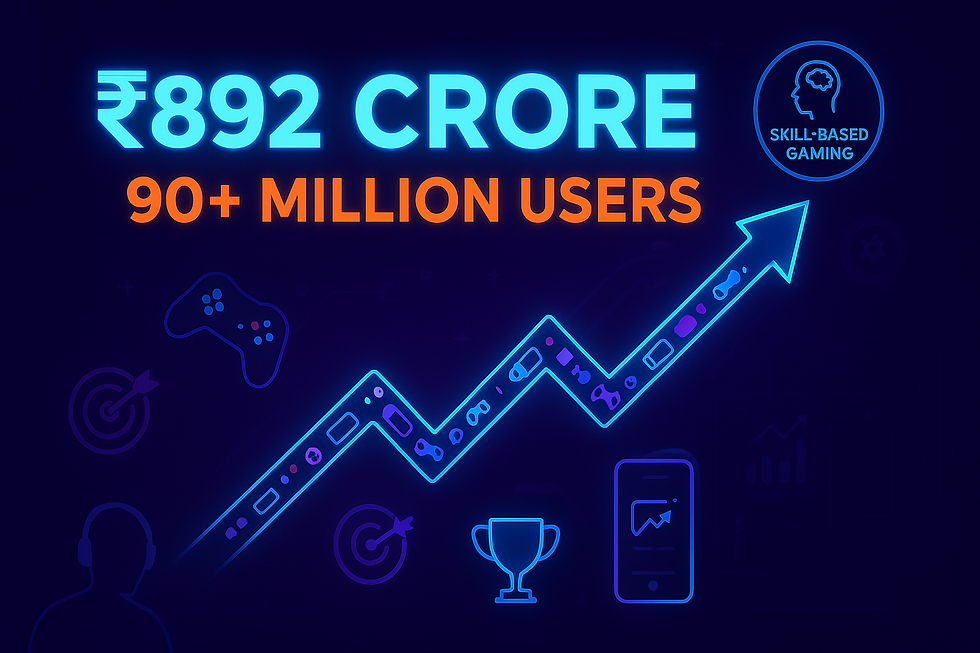
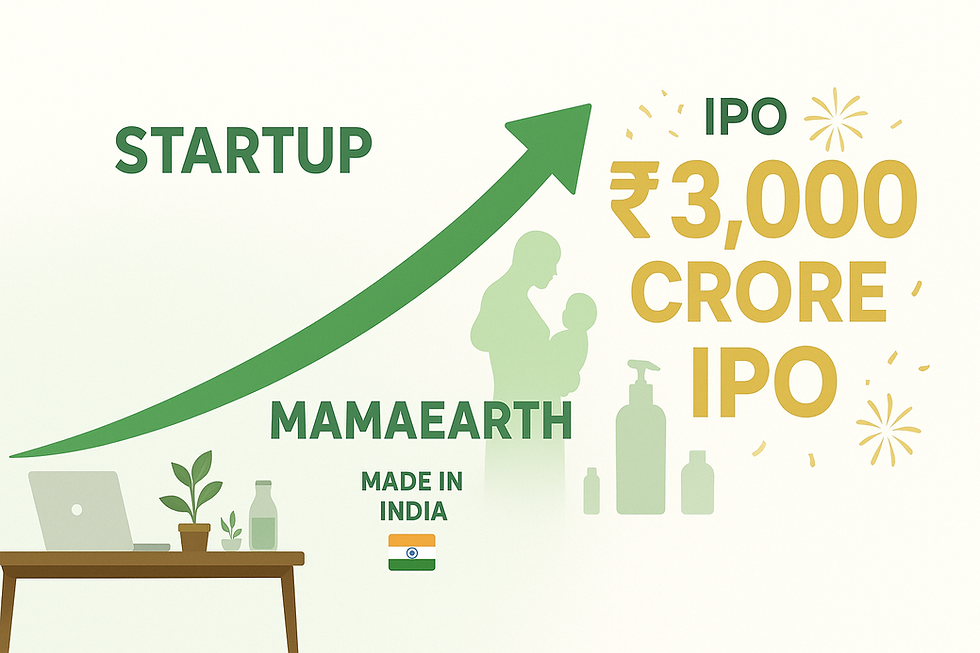
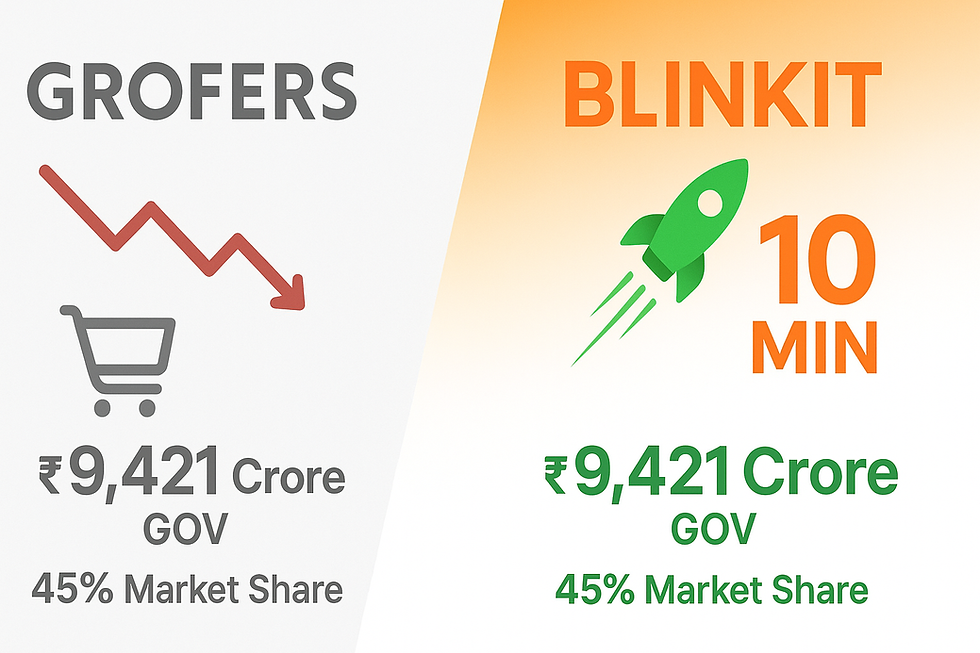
Comments